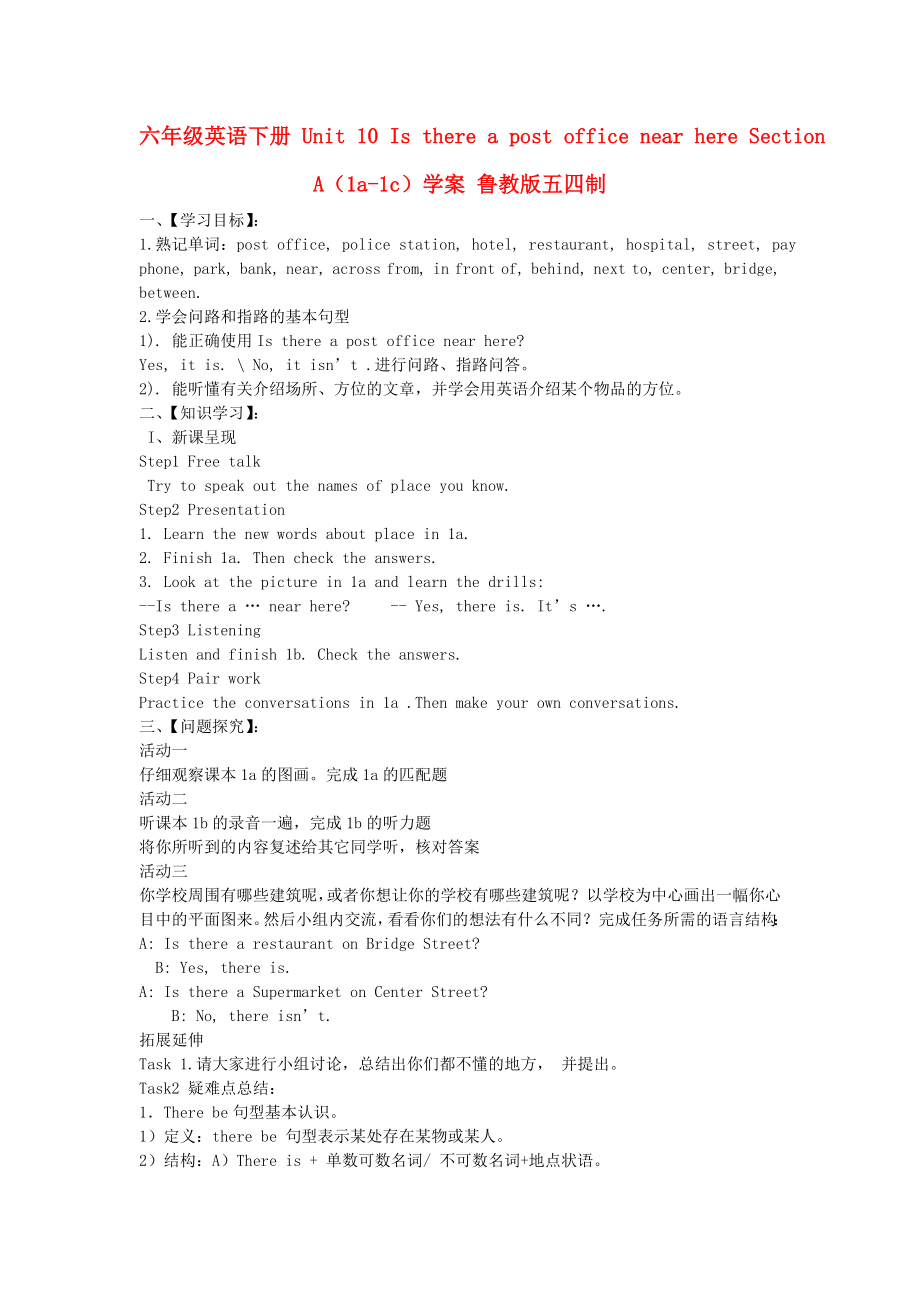《六年級(jí)英語(yǔ)下冊(cè) Unit 10 Is there a post office near here Section A(1a-1c)學(xué)案 魯教版五四制》由會(huì)員分享,可在線閱讀����,更多相關(guān)《六年級(jí)英語(yǔ)下冊(cè) Unit 10 Is there a post office near here Section A(1a-1c)學(xué)案 魯教版五四制(3頁(yè)珍藏版)》請(qǐng)?jiān)谘b配圖網(wǎng)上搜索�。
1��、六年級(jí)英語(yǔ)下冊(cè) Unit 10 Is there a post office near here Section A(1a-1c)學(xué)案 魯教版五四制
一���、【學(xué)習(xí)目標(biāo)】:
1.熟記單詞:post office, police station, hotel, restaurant, hospital, street, pay phone, park, bank, near, across from, in front of, behind, next to, center, bridge, between.
2.學(xué)會(huì)問(wèn)路和指路的基本句型
1). 能正確使用Is there a post o
2��、ffice near here?
Yes, it is. \ No, it isn’t .進(jìn)行問(wèn)路����、指路問(wèn)答����。
2). 能聽(tīng)懂有關(guān)介紹場(chǎng)所��、方位的文章�����,并學(xué)會(huì)用英語(yǔ)介紹某個(gè)物品的方位。
二��、【知識(shí)學(xué)習(xí)】:
I�����、新課呈現(xiàn)
Step1 Free talk
Try to speak out the names of place you know.
Step2 Presentation
1. Learn the new words about place in 1a.
2. Finish 1a. Then check the answers.
3. Look at t
3、he picture in 1a and learn the drills:
--Is there a … near here? -- Yes, there is. It’s ….
Step3 Listening
Listen and finish 1b. Check the answers.
Step4 Pair work
Practice the conversations in 1a .Then make your own conversations.
三�、【問(wèn)題探究】:
活動(dòng)一
仔細(xì)觀察課本1a的圖畫(huà)��。完成1a的匹配題
活動(dòng)二
聽(tīng)課本1b的錄音一遍,完成1
4�����、b的聽(tīng)力題
將你所聽(tīng)到的內(nèi)容復(fù)述給其它同學(xué)聽(tīng),核對(duì)答案
活動(dòng)三
你學(xué)校周圍有哪些建筑呢�����,或者你想讓你的學(xué)校有哪些建筑呢��?以學(xué)校為中心畫(huà)出一幅你心目中的平面圖來(lái)。然后小組內(nèi)交流����,看看你們的想法有什么不同�����?完成任務(wù)所需的語(yǔ)言結(jié)構(gòu):
A: Is there a restaurant on Bridge Street?
B: Yes, there is.
A: Is there a Supermarket on Center Street?
B: No, there isn’t.
拓展延伸
Task 1.請(qǐng)大家進(jìn)行小組討論����,總結(jié)出你們都不懂的地方�����,
5�、并提出�。
Task2 疑難點(diǎn)總結(jié):
1.There be句型基本認(rèn)識(shí)�。
1)定義:there be 句型表示某處存在某物或某人�����。
2)結(jié)構(gòu):A)There is + 單數(shù)可數(shù)名詞/ 不可數(shù)名詞+地點(diǎn)狀語(yǔ)。
B)There are +單數(shù)名詞+地點(diǎn)狀語(yǔ)
▲注意事項(xiàng):謂語(yǔ)動(dòng)詞be要與主語(yǔ)(某人或某物)的數(shù)保持一致�����。當(dāng)主語(yǔ)是兩個(gè)或兩個(gè)以上的名詞時(shí),謂語(yǔ)動(dòng)詞要跟它最近的那個(gè)名詞一致(就近原則)�。
3)變成否定句
There be句型的否定式的構(gòu)成��,在be動(dòng)詞后加上not即可��。There are some pictures on the wall. →There aren't any
6、 pictures on the wall.
4)���、變成一般疑問(wèn)句
There be句型的一般疑問(wèn)句變化是把be動(dòng)詞調(diào)整到句首�,再在句尾加上問(wèn)號(hào)即可�。當(dāng)肯定句中有some時(shí)��,要將其改為any(否定變化也一樣)There is some water on Mars. → Is there any water on Mars?
2.pay v 支付���,付錢(qián)
pay for +物 “付錢(qián)買(mǎi)某物”
pay + 錢(qián)+for +物 “付多少錢(qián)買(mǎi)某物
She pays 5 Yuan for the books.
四�����、【鞏固訓(xùn)練】(相信自己:我能行�。但一定要仔細(xì)哦?�。?
一、首字母
7��、填空:
1. My house is n______ my school.
2. We can post letters at a post o_______.
3. We can read books in our school l________.
4. He is a doctor. He works in an h__________.
5. The p_____ phone is over here.
二.根據(jù)漢語(yǔ)完成句子:
1.Our school is _______ the hotel ______( 在…之間)the hospital.
2.There is
8、a restaurant__________(在…前面)the hospital.
3.The restaurant is ___________(在對(duì)面)the school.
三.單項(xiàng)選擇
( ) 1. My English teacher stands between Sally and ____.
A. his B. me C. your D. my
( ) 2. The kids often play games in the ____ on Sundays.
A. library B. park C. bank
9����、D. post office
四��、學(xué)法引導(dǎo)
交際教學(xué)法����,情境教學(xué)法
五�、反思
本課利用多媒體進(jìn)行教學(xué)���,充分發(fā)揮了多媒體聲音�����、圖像�、文字�、動(dòng)畫(huà)為一體的優(yōu)勢(shì)���,呈現(xiàn)直觀,讓視聽(tīng)有機(jī)結(jié)合�����,能使學(xué)生自然地將英語(yǔ)學(xué)習(xí)直接與現(xiàn)實(shí)生活中的事物建立聯(lián)系���,有助于培養(yǎng)學(xué)生用英語(yǔ)思維的能力。此外�,在教授語(yǔ)法的過(guò)程中將傳統(tǒng)的填鴨式教法轉(zhuǎn)變成教師引導(dǎo)�、學(xué)生看圖自主歸納��,這樣更能凸現(xiàn)學(xué)生的主體地位�。整節(jié)課我不僅激發(fā)學(xué)生的學(xué)習(xí)興趣����,活躍了課堂氣氛,而且循序漸進(jìn)地落實(shí)了各教學(xué)步驟,取得了較好的教學(xué)效果��。?
【鞏固訓(xùn)練】答案
一����、首字母填空:
1. near 2. Office 3.library 4. Hospital 5.pay
二.根據(jù)漢語(yǔ)完成句子:
1. between����,and 2. in front of 3. across from
三.單項(xiàng)選擇
1. B 2.B
 六年級(jí)英語(yǔ)下冊(cè) Unit 10 Is there a post office near here Section A(1a-1c)學(xué)案 魯教版五四制
六年級(jí)英語(yǔ)下冊(cè) Unit 10 Is there a post office near here Section A(1a-1c)學(xué)案 魯教版五四制

